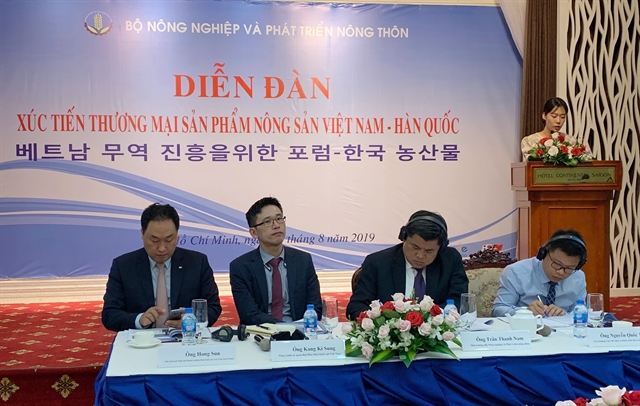With its high demand for agricultural products, South Korea offers Viet Nam the opportunity to boost its farm exports.

With its high demand for agricultural products, South Korea offers Viet Nam the opportunity to boost its farm exports.
But to enable more products to enter that market, Vietnamese firms and farmers must focus on improving quality, building brand and offering competitive prices, delegates told a forum on Viet Nam-Korea Trade Promotion of Agricultural Products in HCM City on August 29.
Le Thanh Hoa, deputy director general of the Agro Processing and Market Development Authority, said South Korea’s agricultural imports have soared in recent years, reaching US$35.2 billion last year.
Yet Viet Nam’s exports were very modest at around $2 billion, he said.
Deputy Minister of Agricultural and Rural Development Tran Thanh Nam, said: “Bilateral trade in the agricultural sector is very low compared to the potential of the two countries.”
Viet Nam exports wooden products, seafood and fruits to South Korea and imports animal feed, fertilisers, seafood and fruits from there, he said.
“South Korea has allowed the import of coconut, pineapple, banana, mango and dragon fruit from Viet Nam.”
Koreans are very fond of Vietnamese fruits and seafood, while Vietnamese like many Korean products, including kimchi, he said.
Hong Sun, vice chairman of the Korea Chamber of Business in Viet Nam, said to be able to enter the market, agricultural products must meet certain conditions like consistent quality, size, colour, and breeds and strong brands and have pricing strategies to ensure competitiveness.
He called on Viet Nam’s agricultural sector to speed up the development of organic agriculture to meet international export standards, including his country’s.
Relevant agencies should instruct farmers in technological application to improve product quality and output, he said.
Son Sung Hoon, CEO of CJ Freshway in Viet Nam, said to expand exports of agro-forestry and aquatic products, Vietnamese companies must ensure they have a steady supply of quality raw materials.
Choosy markets like Korea have very strict regulations and standards for imported goods, and so relevant authorities must update farmers and producers of these standards to enable them to meet these criteria, he said.
Hoa said: “Enterprises need to enhance their awareness of technical regulations and sanitary and phyto-sanitary requirements in various markets, change the food safety regime from only checking final products to monitoring all phases of the production chain.”
Establishing a co-operation mechanism between regulatory authorities and producers is imperative to ensure the entire supply chain and products meet food safety and quality standards, he added.
Kim Yae Jin, vice director of the Korea Agro-trade Centre in HCM City, spoke about Korean consumer trends that enterprises need to know if they plan to enter that market.
Food safety is a top priority for consumers when choosing a product, she said.
She said the Korean Ministry of Food and Drug Safety plans to strengthen inspection of foreign foods.
With an increasing number of one-person households, demand for products in small packages has increased significantly, she said.
Consumers focus on product differentiation than their prices, she said, adding that they increasingly prefer eco-friendly packaging.
At the forum, delegates also spoke about food safety inspection regulations and aquatic product quarantine in Korea. — VNS





